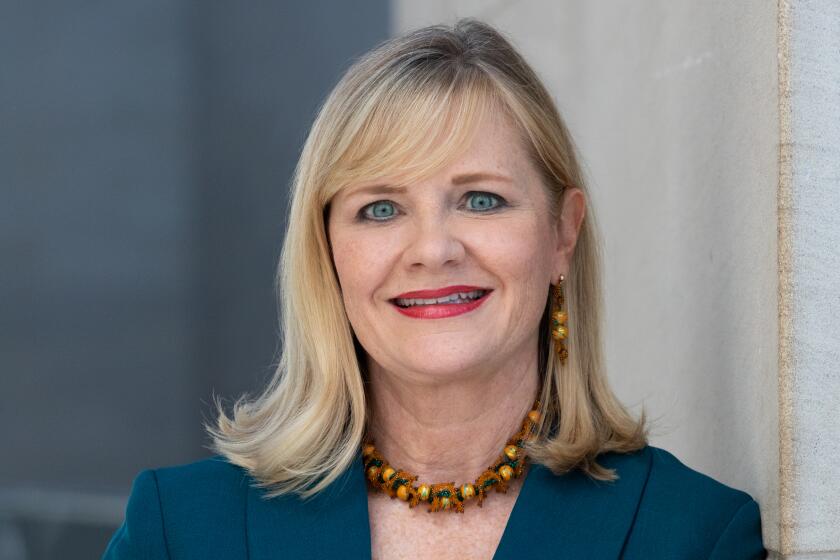Bringing Audiences to Their Feet
When William Shakespeare wrote “all the world’s a stage,” it’s safe to say he wasn’t referring specifically to Hancock Park, the recently renovated stretch of green behind the Los Angeles County Museum of Art that encircles the La Brea tar pits.
But for the past three years, this area has been the only stage for the Foliage Theatre Project’s Shakespeare in the Park, an annual summer series of “free roaming outdoor performances.” Each performance is followed by a Shakespeare workshop for kids 8 to 18. Up next is “Love’s Labour’s Lost,” directed by Alexander Yannis Stephano, opening Sept. 4.
Unlike the similar phrase “free range” (usually reserved for cows and chickens) the “free” in “free roaming” means free of charge. And actors are never eaten after the performance--even by the critics, who so far have given this nonprofit professional company mainly positive reviews.
LA Weekly wrote that 1997’s “As You Like It,” which was also performed at Barnsdall Park, had “a passionate vitality, while the ensemble’s witty if traditional interpretations won’t disappoint purists.” In a review in The Times in 1998, Philip Brandes praised the company’s presentations of “Much Ado About Nothing” and “The Tempest,” which he said “sport a high caliber of performance and staging that belies the ‘found’ setting and free admission.”
Still, the basics are much the same for both free-range livestock and free-roaming actors: The performances of somewhat abridged Shakespeare plays not only take place without a conventional stage but also travel through the park, free-range-style--and the audience traipses after them.
“There’s a grittiness to being outside and seeing theater,” says company founder and artistic director Deborah Faust, a transplanted Bostonian who has an extensive theater resume and maintains another career acting in commercials and TV. So far, she has not performed with Foliage but hopes to have time for that next season.
“The great thing about theater is the feeling,” she says. “You can’t put your finger on it, but [if it’s not there] you’re going to miss it. That’s why I don’t worry about live theater dying, because we need that. And when you’re outside, the variables are a thousand times more.”
Faust says she became interested in outdoor Shakespeare because “I really felt like classical work didn’t work in a black-box setting. The language needs more space, it seems to me, it needs room to breathe.”
Critics have enjoyed Foliage’s roaming Shakespeare, but they do grumble about hot summer weather and suggest sensible shoes. Not only is there no stage, there are no lights or sound equipment, which is why productions only take place during the day. Last summer, the company brought beach umbrellas to protect audiences from an unseasonable heat wave, but hot is hot.
Lauren Daniels, the company’s managing director and producer, who also has held leading roles in the plays, says actors and audience members regularly deal with sticky tar bubbling up from the ground, dogs, picnickers and tour groups visiting LACMA or the park’s George C. Page Museum of La Brea Discoveries.
“A tar pits tour may go right through the play, and [the people] say: ‘What are you doing?’ ” Daniels says. “It’s a surprise; all of a sudden there is acting happening all around them.
“Most people are cool about it. Kids can get as close as they want; they can come up to you and play with your costume, or whatever. Most people like the roaming. Of course, some people hate it,” Daniels adds with a laugh.
Foliage Theatre Project operates on an even less formal basis than its more established counterpart, Shakespeare Festival/LA, which takes a portable stage to various outdoor locations, most recently Marina del Rey’s Burton Chace Park for July’s “As You Like It.” And the festival’s artistic director-producer, Ben Donenberg, heartily approves of Foliage’s commitment to actively engaging the audience.
“It really does make it a much more active experience, not just sitting in the dark in some alpha-dreamlike state,” Donenberg says. “It’s more holistic.
“I think this outdoor theater thing, making your audience move around, is pointing to a trend in American theater that activates the audience and takes them out of this passive, watching tradition.”
During its three-year tenure at Hancock Park, Foliage has had to deal with not only the usual vagaries of outdoor performance but also construction work on the $7-million Hancock Park Improvement Project, initiated by a 1995 donation from LACMA trustee Dorothy Collins Brown, who allotted $5 million for renovation and $2 million for special projects for the 23-acre park.
*
At one point last season, says artistic director Faust, all that was left as rehearsal and performance space was a sort of runway strip through the construction debris.
That renovation, completed in July, includes the $800,000 Dorothy Collins Brown Amphitheatre, an elliptical, red granite structure designed by artist Jackie Ferrara that is available to the company. Faust says the company does not plan to give up roaming, but in coming years may do one moving performance, and a stationary one at the amphitheater. The fixed location may allow it to venture into Shakespeare’s tragedies, which Foliage considers less well suited to frolicking through the park than the comedies. “And you don’t want to travel just for travel’s sake,” Faust adds.
With or without a stage, Faust remains committed to providing free performances to make sure theater remains accessible to everyone, especially young people. “When I was [studying theater] in New York, [there were programs] to bus in kids and take them to a Broadway show [for free],” she says. “And they would just love it--but there was no follow-through. It was opening a door for them, but then it was shut again. They’re going to get it for free once--but at $45 a ticket, they’re not going to get it again.”
Faust also remains committed to Foliage’s Juvenile Detention Camp Program, which takes young men from Camp Kilpatrick, a maximum-security youth offender facility in the Santa Monica Mountains, and gives them the opportunity to perform in their own production of “Othello,” in museum settings.
Faust, who studied theater arts and art history at Boston College before entering a two-year training program at New York’s Circle in the Square, developed the idea of performing in museums through her own perception of art galleries as theater; walking through a gallery of an artist’s work is to see that artist’s life story unfold in pictures.
The Detention Camp Program, which performed at LACMA in 1998, first presented its own take on Shakespeare in 1996 among the stately white columns of the Getty Museum’s Italian villa in Malibu. The teens called that version of the story “Thugs in Tights: By the Young Gentlemen of Camp Kilpatrick.”
Carrie Sutton, education specialist for the Getty Museum’s school and teacher program, said the two performances were so successful the museum hopes to bring the youths back for further performances at the new Getty Center in Brentwood. “The general public had no idea this wasn’t a drama club from a high school,” Sutton says. To date, Faust reports that only one participant has become a repeat offender.
The youth program is part of Faust’s belief that Los Angeles artists owe something to the community. “So many people come to L.A., and 15 years later, they are still talking about L.A. as if it is a transitional place,” she said. “I’m sorry--after 15 years, you are a resident, and there is a responsibility to give back.” *
*
“LOVE’S LABOUR’S LOST,” Hancock Park, at 6th and Ogden entrance. Dates: Opens Sept. 4. Regular schedule: Saturdays and Sundays, 4 p.m. Ends Oct. 3. Price: Free. Phone: (323) 957-4640.
More to Read
The biggest entertainment stories
Get our big stories about Hollywood, film, television, music, arts, culture and more right in your inbox as soon as they publish.
You may occasionally receive promotional content from the Los Angeles Times.






